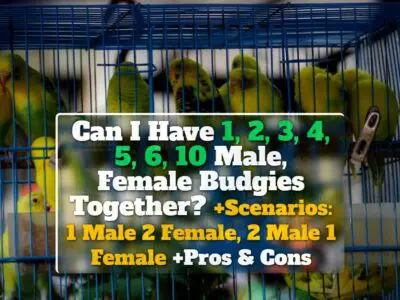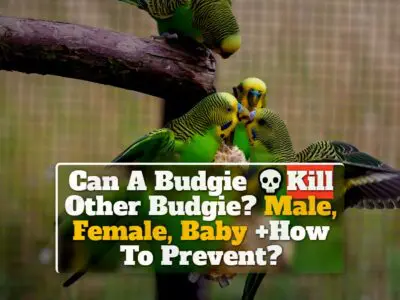Budgies, inherently playful birds, sometimes engage in social bickering over food, toys, or territory.
It’s essential to distinguish between their playful interactions and genuine aggression. Conflicts might arise from territorial issues, particularly among females, disputes over food, or differences in temperament.
However, understanding their behavior and providing them with adequate resources can help minimize disputes.
Dive into the delightful realm of budgies! From my unique experiences and comprehensive research, I’ve identified the key indicators of budgie fighting behavior.
Whether you’re a seasoned budgie owner or just starting, recognizing when your birds are just having fun or genuinely clashing is vital.
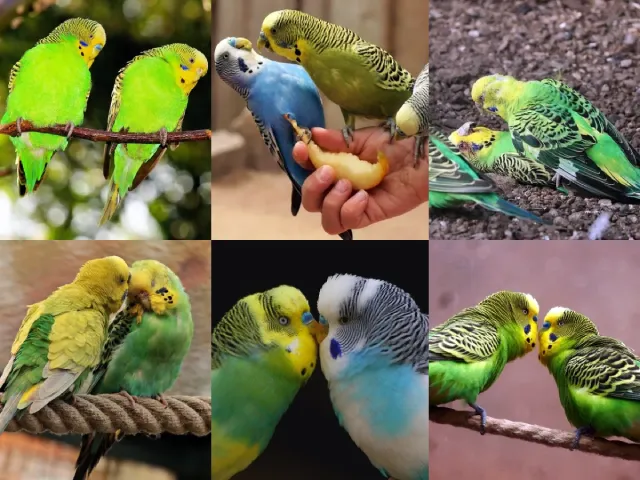
Understanding Budgie Behavior
Budgies are fascinating creatures with complex social behaviors that stem from their lives in the wild.
Understanding these behaviors can help caregivers provide a more comfortable environment for these birds in captivity.
Natural Behaviors in the Wild vs Captivity
In the wild, budgies live in flocks and engage in daily activities like foraging for food, playing, singing, and socializing.
Their behaviors are often influenced by their surroundings, such as the need to defend territories or find a mate.
When in captivity, some of these behaviors may remain, but their context changes.
For instance, the playful bickering seen in captivity over toys or perches may be a modified form of the territorial behaviors they exhibit in the wild.
Therefore, while some actions might seem out of place in a domestic setting, they can be rooted in their natural instincts.
The Importance of Recognizing Signs of Aggression
Recognizing aggression in budgies is paramount for their well-being. Aggressive behaviors like raised wings, hissing, biting feet, and chasing can indicate that a budgie feels threatened or overwhelmed.
Similarly, actions such as guarding resources or defending a perch show a bird’s discomfort with sharing or feeling overcrowded.
When such behaviors are observed, it’s essential for caregivers to intervene to prevent potential harm.
Differentiating between Playful Banter and Genuine Aggression
Budgies, being inherently playful, can sometimes display behaviors that may be misconstrued as aggression.
Here’s how one can differentiate:
Playful Behaviors:
- Body Language: When budgies play, their demeanor is calm. Using their beaks in various activities combined with gentle singing indicates a content bird.
- Preening and Regurgitating: These acts symbolize affection among budgies.
- Beak Touching: Often seen as a form of ‘bird kiss’, it is a sign of camaraderie.
- Sitting Together: This showcases their bond and is a clear sign of their comfort with one another.
- Bobbing and Singing: These are undeniable expressions of a happy budgie.
On the other hand:
Aggressive Behaviors:
- Raised Wings, Hissing, Biting Feet, Chasing: These are red flags indicating an upset or aggressive budgie.
- Guarding Resources: When a budgie actively stops another from accessing essentials like food or water, it’s a cause for concern.
- Defending a Perch: Feeling overcrowded can lead to such behaviors.
- Screaming and Wrestling: These are clear indicators of severe disagreements.
Reasons Why Budgies Fight
Budgies have their reasons for disagreements. While they are generally sociable birds, various factors can lead to conflicts.
Let’s delve deeper into these reasons.
Territorial Instincts & Resource Fights
Territorial behaviors in budgies stem from their instinct to protect what they perceive as theirs.
In the wild, these birds might stake a claim over a nesting spot or a particular feeding area.
In captivity, this translates to fights over toys, perches, or even a particular corner of the cage.
For instance, introducing a new toy or budgie can lead to a resident budgie feeling its territory is under threat.
Especially in females, this instinct is strong, and they might become more aggressive if they feel another budgie is intruding on their space.
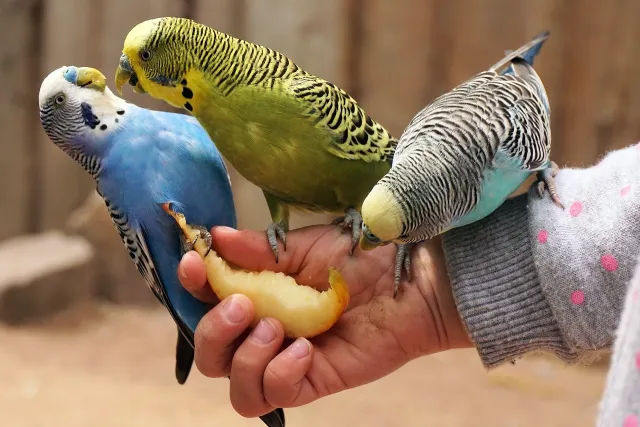
Mating Rivalry
When the breeding season comes around, budgies can become more competitive. This is particularly seen among female budgies.
They might exhibit behaviors like chasing off other females or becoming more vocal.
The reason? They’re trying to attract a mate and ensure they have the best chance at rearing offspring.
It’s nature’s way of ensuring the strongest genes get passed on. So, during this time, it’s not uncommon to see budgies pecking at each other or being extra protective of their space.
Establishing Social Authority
Just like in school where some kids want to be the “leader of the pack,” budgies too have a social hierarchy.
This means some birds will be dominant while others are more submissive.
Budgies will often engage in what looks like a tussle to establish who is the “boss.” These behaviors can include one budgie consistently taking the higher perch or one budgie always being the first to eat.
By doing this, they’re showing other budgies who’s in charge.
Incompatibility
Sometimes budgies might not get along due to personality differences. One bird might be super active and playful, while another prefers a more relaxed environment.
Or, one might be naturally more aggressive, while another is timid. When such birds are paired together, disagreements can arise because their temperaments clash.
It’s a bit like trying to force two very different people to share a room – sometimes, it just doesn’t work out.
Overcrowding
Imagine being in a tiny room with lots of people and very little space to move – it would be uncomfortable, right?
Budgies feel the same way when crammed in a small cage. Overcrowding can lead to stress, and stressed budgies are more likely to lash out.
Ensuring that your budgies have enough space to fly, play, and have a little alone time can make a big difference.
If a cage is too small, or if there aren’t enough perches or toys, budgies might become aggressive, defending what little space or resources they have.
Distinguishing Play from Real Fighting
Budgies, with their chirpy personalities and active behaviors, often leave caregivers wondering whether they’re simply playing or if they’re actually fighting.
It’s important for anyone caring for these birds to distinguish between the two to ensure the well-being of their feathery friends.
Signs of Playful Behavior
Recognizing playful behavior in budgies is the first step towards understanding their social dynamics.
Mutual Grooming
When you see budgies preening each other, it’s a sign of affection and trust.
They’re helping each other clean spots they can’t easily reach.
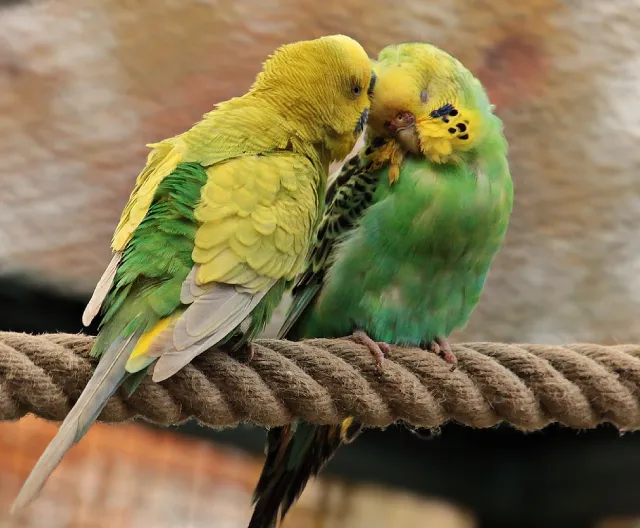
Beak Touching
This action is like a friendly ‘bird handshake’ or even a ‘bird kiss’.
It’s their way of showing affection and saying, “Hey, we’re buddies!”
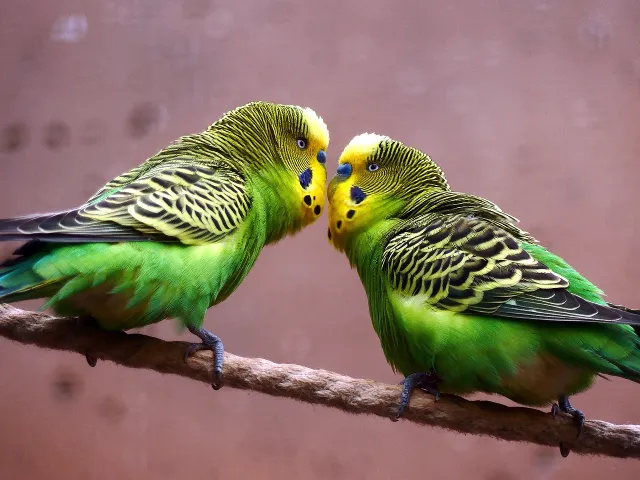
Sitting Together
Budgies who enjoy each other’s company will often sit close together on the same perch.
This closeness is a sign of camaraderie and friendship.

Regurgitating
While it may sound a bit odd to us, when a budgie regurgitates food for another, it’s a sign of deep affection.
They’re essentially sharing their meals, which is a big deal in the bird world!
Signs of Aggressive Behavior
Now, on the other side of the spectrum, there are clear indicators that a budgie is upset or being aggressive.
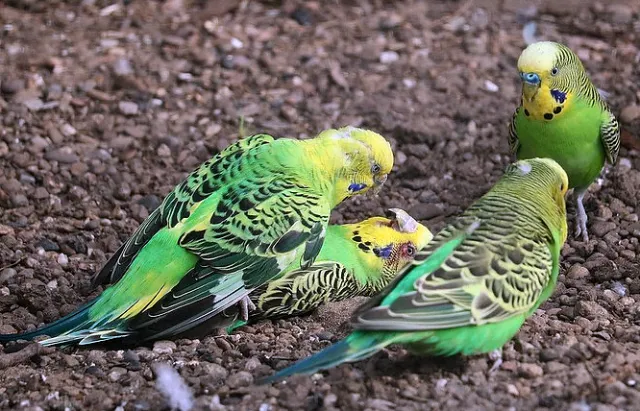
Raised Wings
When a budgie flares its wings out, it’s trying to look bigger and more intimidating.
It’s a way of saying, “Back off!”
Hissing
If a budgie is hissing, it’s definitely not happy. This is a warning sound, signaling that they’re feeling threatened or annoyed.
Biting Feet
A budgie that bites at another’s feet is showing aggression. It’s a clear sign they want the other bird to move or leave.
Chasing
If one budgie is constantly chasing another around the cage, it’s not playing tag.
Instead, it’s showing dominance and trying to claim territory or resources.
How to Stop Budgies from Fighting?
Budgies, despite their cheerful nature, can sometimes engage in real conflicts. Recognizing the difference between a friendly tiff and an actual fight is essential.
Once you identify that a fight is happening, it’s time to intervene safely and effectively.
Intervention Methods
When budgies start showing signs of aggression towards each other, immediate intervention is crucial to prevent injuries.
Using a Laser Pointer: Just like cats, budgies can be distracted by a moving laser point.
By redirecting their attention to the laser dot, you can effectively break up a squabble.
It provides an immediate focus away from the source of their dispute.
Verbal Disruption: Sometimes, all it takes to halt a fight is the sound of a familiar voice.
Gently talking or calling out to your budgies can make them stop and listen.
This short pause often cools down heated situations.
Loud Noises: Clapping your hands or tapping on the cage can startle budgies and interrupt aggressive behaviors.
However, this method should be used cautiously as too loud or frequent noises might stress your budgies.
Maintaining a Calm Demeanor: It’s essential to stay calm yourself. Birds can pick up on human emotions, and if you’re frantic, it might escalate the situation.
Approach with slow, measured movements and avoid yelling.
Prevention Strategies
Prevention is always better than cure. By understanding the causes of their conflicts and taking preventative measures, you can reduce the chances of fights occurring in the first place.
Consistent Food Supply: Ensuring that there’s enough food and water for everyone is fundamental.
A hungry budgie is a grumpy budgie, and food scarcity can cause disputes.
Observing Behaviors: Spend time watching your budgies. Recognize patterns or triggers for disagreements.
For instance, if one budgie always becomes aggressive around a specific toy, consider getting another of the same toy or removing it.
Pairing Thoughtfully: Not all budgies will get along, just like people. When introducing a new budgie, do it gradually.
Allow them to see and hear each other without direct contact. Use a divider or place their cages next to each other.
Over time, and with observation, you’ll be able to gauge whether it’s safe for them to share a space.
Male vs. Female Budgie Aggression
Budgies are interesting little creatures with unique behaviors. Budgie behavior can differ based on whether they are male or female.
Recognizing these differences can help caregivers provide the best environment for them.
Why Male Budgies Fight?
Male budgies have their own set of behaviors that can sometimes lead to aggression.
- Territorial Displays: While both male and female budgies can be territorial, males often establish dominance over a certain area, like a favorite perch or toy. If another male invades this space, disputes can arise.
- Mating Competitions: When it’s breeding season, male budgies might become more aggressive as they compete for the attention of females. They want to prove they’re the best mate!
- Temperament Variances: Some male budgies might naturally be more active or assertive, which can lead to occasional disagreements with other males.
Why Female Budgies Fight?
Female budgies are also known to display unique behaviors, some of which can be aggressive.
- Territorial Nature: Females, in particular, can be very territorial. They might claim certain toys or spots in the cage and will defend them if they feel threatened.
- Mating Disputes: During breeding season, female budgies can become more aggressive. They might get upset if another female is getting too close to their chosen mate.
- Resource Guarding: Females can sometimes be seen guarding resources. This means they might prevent other budgies, male or female, from accessing food, water, or toys.
Why Do Baby Budgies Fight?
Baby budgies are adorable, but they can have disputes too! Most of the time, their fights aren’t about dominance or resources, but more about learning and growing.
- Learning Social Interactions: Just like puppies or kittens, baby budgies play with each other to learn about their world. This playing can sometimes look like fighting, but it’s usually harmless.
- Food Competition: When its feeding time, baby budgies want to eat! Sometimes they might peck at each other if they feel like their sibling is getting more food.
- Space Exploration: As baby budgies grow and explore their environment, they might bump into each other or want the same perch. This can lead to small disputes.
Signs Budgies Like Each Other
Just like we show our friends we like them with hugs and high-fives, budgies have their ways too!
- Perching Together: When budgies sit together on a perch, it’s like holding hands. They’re saying, “I like being with you!”
- Preening Each Other: Preening is when one budgie helps clean the feathers of another. It’s their way of taking care of their friend.
- Sharing Food: Passing food from one beak to another is a sign of trust and friendship. It’s like sharing your lunch at school!
- Playing Together: If you see your budgies gently playing, bobbing their heads, or singing, they’re having a good time.
Faqs
Are Certain Budgie Colors More Prone to Aggression?
No, budgie colors don’t determine their behavior. Just like people’s hair color doesn’t tell us about their personalities, a budgie’s feather color isn’t linked to aggression.
It’s more about individual personalities and circumstances.
Can a Budgie’s Diet Influence Its Aggressiveness?
Yes, a balanced diet is essential for budgies. If they don’t get the right nutrients, they can become irritable.
It’s like when we get cranky if we’re super hungry! A well-fed budgie is typically a happy budgie.
How Do You Introduce a New Budgie to an Existing Group?
Introducing a new friend takes careful steps. First, keep the new budgie in a separate cage close to the group.
This way, they can see and hear each other without touching. Over time, they’ll get used to one another.
When they seem calm and curious, you can let them play together under close watch.
Do Seasonal Changes Affect Budgie Behavior?
Yes, like many animals, budgies can be sensitive to seasonal changes. For instance, during breeding seasons, they might act a bit more territorial.
They may also be more active or sing more when the days are longer in spring and summer.
Is It Advisable to Keep Budgies of Different Ages Together?
Budgies of different ages can get along, but it’s important to watch them.
Baby budgies might be more playful, while older ones might want to rest more.
Think of it as having a toddler play with a grandparent. They need to understand each other’s pace!
How Do You Monitor Budgie Interactions When You’re Not Home?
You can set up a camera or pet monitor to keep an eye on your feathery friends.
It’s a great way to make sure everyone’s playing nice and not fighting over toys.
Should You Always Keep Budgies in Pairs or Groups?
Budgies are social birds and love company. Having a friend or two can make them happier.
But if you spend a lot of time talking and playing with one budgie, they can be okay on their own.
Just make sure they’re never lonely!
How Long Does It Typically Take for Budgies to Establish Dominance?
Budgies have their own timelines. Some might figure out who’s boss in a few days, while others might take weeks.
It’s all about communication and setting boundaries, just like when kids figure out who gets the top bunk in their room!
